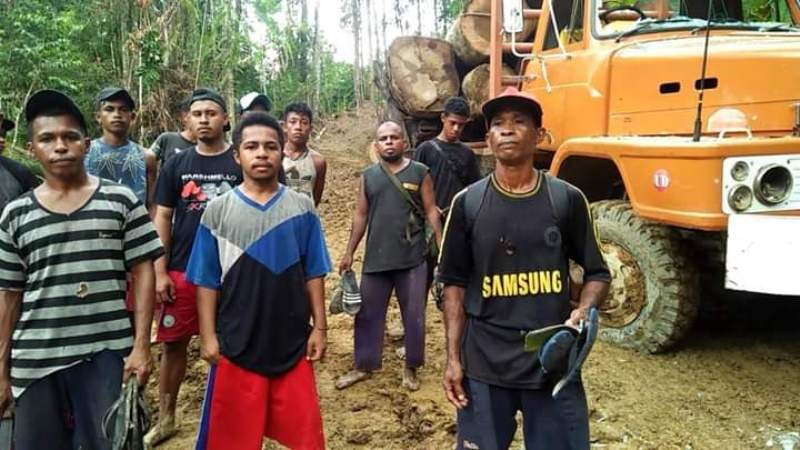Popular Reads
Top Results
Can't find what you're looking for?
View all search resultsPopular Reads
Top Results
Can't find what you're looking for?
View all search resultsSabuai people fight for sacred forests
The indigenous people of Sabuai village in Maluku have proven time and again their tenacity to go up against commercial entities out to desecrate their sacred forests.
Change text size
Gift Premium Articles
to Anyone
I
t has been almost a year since 21-year-old Khaleb Yamarua, a resident of Sabuai village in Maluku’s Eastern Seram regency, was arrested for a vandalism charge after trying to protect his village’s heritage forest.
Yet, he was still able to grimly recall the details of that day as if it only happened yesterday.
On Feb. 18, 2020, at around 10 a.m. Eastern Indonesian Time, police officers stormed his village and proceeded to round him and dozens of other residents up, following a report filed by CV Sumber Berkat Makmur, a logging firm, accusing them of malicious destruction of property.
A day before the police questioned them in relation to the company’s damaged equipment, the indigenous Sabuai people staged a protest to stop the loggers from felling trees on a site they claimed was part of their tribal land.
Read also: Indigenous groups combine rituals, protocols in effort to banish virus
The police account stated that the protest had allegedly turned into a riot, which culminated in what is claimed to be the chaining down of heavy machinery used to extract timber from the forests of Sabuai’s Mount Ahwale.
The police ended up naming Khaleb and his relative, Stefanus Ahwalam, as suspects on Feb. 24. While neither were thrown in jail, both were put under house arrest and asked to regularly report to the police.
The police arrests have had the unintended consequence of encroaching on Khaleb’s college education.
“That incident forced me to sacrifice time that I could be using for studying, especially since I am required to report back constantly to the police,” he said during a recent interview.
“It takes up so much time.”
But in spite of the personal setback, Khaleb insisted he would never give up fighting for his people’s rights over the heritage forest.
He was not alone. His twin, Yoshua Ahwalam, and the other Sibuai villagers stood ready to assist him.
Khaleb told The Jakarta Post that he and his fellow Sibuai villagers had planned to drive away CV SBM from the area, ever since the company started logging in their heritage forests in 2019.
He acknowledged that the protest was a reflection of the Sabuai people’s anger and disappointment toward the logging company. For the villagers, it was a matter of cause and effect.
Read also: After 75 years of independence, indigenous peoples in Indonesia still struggling for equal
They had made several attempts to prevent the company from inflicting more damage on their sacred forest. Khaleb said his tribe leader had repeatedly attempted sasi pohon, a ritual of customary law performed to prohibit people from felling trees in a certain area, with the aim of allowing the ecosystem to replenish.
“We have performed sasi three times. The first and second times were on May 9 and 11, 2019, which we follow up with a traditional ceremony on June 7,” he said.
The villagers also filed their own police report on Aug. 6 that year, which fell on deaf ears, Khaleb claims.
Their cause also seemed to have hit a wall with the local government. Maluku Forestry Agency head Sadli Lie denied that the area in question was zoned as customary forest. Sadli said it fell under the category of areas for other uses (APL).
In 2018, CV SBM obtained a plantation permit from the Eastern Seram Forestry Agency to establish a nutmeg harvesting industry in Sabuai village, which is located on top of a 1,183-hectare plot of land.
The company had initially promised to recruit the villagers to work on the nutmeg plantation project and distribute 5,000 nutmeg seeds to the village. However, the villagers claimed to have never witnessed the company make good on its promise, as it shifted focus toward logging operations instead.
CV SBM was not available for comment. The Environment and Forestry Ministry named CV SBM’s commissioner, identified only as IQ, as a suspect in an illegal logging case in March last year.
In addition to the desecration of their sacred land, the indigenous people of Sabuai have also protested against the logging activities and the damage it has inflicted on the forest.
According to Sabuai tribe figure Ibeng Nisdoam, the village’s water source had been contaminated. Some of their water sources were also cut off following a series of landslides that resulted from the exploitation activities.
“The water source is located in the Ahwale forest, so if the forest gets destroyed, it will prevent us from accessing clean water,” Ibeng said.
Sabuai indigenous community chairman Nicko Ahwalam acknowledged that the forest on Mt. Ahwale was a site for valuable lumber. However, the area is also home to historical sites and the cultural heritage of the residents’ ancestors, such as Negeri Lama.
Read also: North Kalimantan indigenous communities awarded UN prize for environmental conservation
The Sabuai people and nature are inseparable, he went on to say. Since the village is surrounded by forest and five huge rivers, most of its residents rely on farming and fishing as their livelihood. This way of living has led them to become protective and respectful of nature.
“These forests and mountains are part of our village. How can we give them up to be exploited?” Nicko said. He also explained that the locals treated the forest as a sole protector against floods during the rainy season.
“So if the forest were to be destroyed, the villagers’ lives would be at risk too.” he said. (dpk)
This story was produced as part of a fellowship program from Econusa Foundation.










